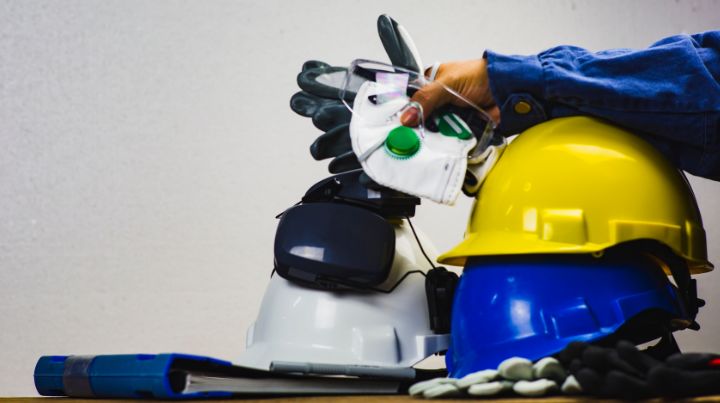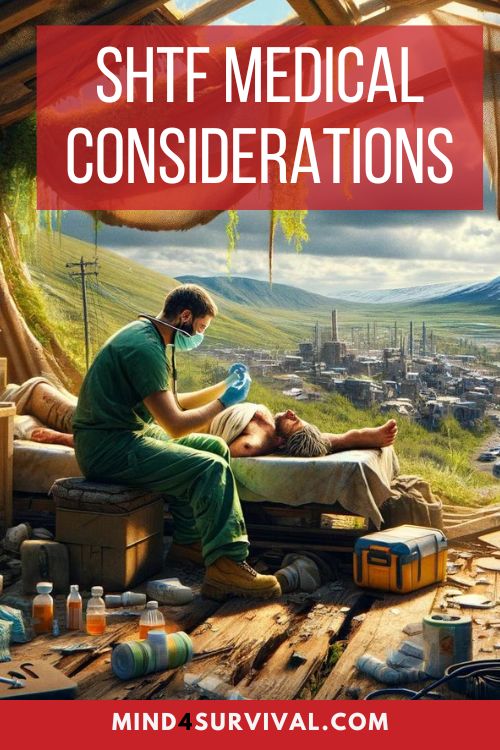It’s a fact that you need a lot of medical supplies during a long-term disaster. Unfortunately, people vastly underestimate the amount of medical supplies they need. A good rule of thumb regarding SHTF medical considerations and long-term disasters is that you don’t have enough supplies.
Many people in the preparedness community have several firearms and thousands of rounds of ammunition, which is fine. However, when it comes to medical supplies, they may have just a single first-aid kit. That’s because they don’t realize that they’re going to have to deal with multiple injuries and illnesses over time. Their supplies will be expended before they know it, especially when prepping for more than one person.
A Long-Term Disaster Will Wreak Havoc on People’s Health
Any unsanitary situation will cause people to become sick. During a disaster, you have fewer options for antibiotics, supplies, and things to deal with these infections, and you end up with a bad outcome compared to what we would have in regular times. So, in a long-term disaster, people are going to die because of a lack of antibiotics, unfortunately.
No More Fish Antibiotics
In the past, people could stock up on human-grade fish antibiotics through various online outlets. Sadly, though, the FDA recently issued a warning to everyone selling fish antibiotics to the public that they are not approved for sale without a prescription. Now, no one can get antibiotics in quantity.
Online Prescription Medications
Prescription medications can be obtained from companies like The Wellness Company. Typically, they provide a kit of several helpful prescription meds. However, these places only offer them once a year, so the quantities are limited. Therefore, during a long-term disaster, you might use up most of your medications when the first person gets sick and have nothing left when others become ill.
The problem is that in a long-term disaster situation, you may need a full year of medications. For example, you may need 500 amoxicillin if you’re going to be taking care of a group. So, if you’re the medic for a survival group that has 20 people in it, your small quantity of antibiotics may last less than a few months after society shuts down.
In the past, you could get what you wanted with fish antibiotics: 500 doxycycline, 500 azithromycin, 500 amoxicillin. Now, you can’t do that anymore. So, everyone has one less critical tool in their preparedness toolbox. As a result, during a long-term disaster, people are eventually going to die unnecessary deaths because of this. It’s a sad situation for the preparedness world.
How to Stockpile Needed Medications?
When it comes to stockpiling medications, most people have two primary options.
The first is to ask your doctor and tell him or her why you need extra medications. For example, you might be going on a trip and need extra medicines in case you get sick while away from your doctor. Likewise, you might need extra medications because you may get stuck somewhere. Perhaps your doctor will say yes, which may help build a supply of extra medicines for you.
The second option is to refill your prescriptions on the first day you can. Insurance companies will not make you wait until your prescription is empty before authorizing a refill. Therefore, you can go a little early, so ask the pharmacy when you pick up your prescription, “When can I come back and get a refill?” It will always be several days to a week before your prescription runs out. So, you get an extra pill stocked up for each day that you refill before your prescription runs out.
Do that over and over again, and over time, those extra pills will add up to a nice stockpile of additional medications. Always take the old pills first so they don’t expire. Over time, you may accrue many extra pills. Be consistent and disciplined by going the first day they allow you to refill, you will get extra meds stashed away.
Stay Healthy
Prepping means doing what you can before a disaster so that you’re ready to live as well as possible during the disaster. When it comes to health, staying healthy in a survival setting involves starting healthy. You need to do your best to be as healthy as possible right now—before disaster strikes.
For example, if you have a bad knee, try fixing it before a disaster happens. If you have vision problems, consider getting a Lasik procedure to bring your vision as close to 20/20 as possible. Ultimately, getting as healthy as possible before the disaster is essential.
Multivitamins
Ensure you have a good set of vitamins in your system. The easy route is to have multivitamins as part of your survival medicine cabinet. That’s because, in a survival setting, you may face dietary restrictions and not get all the necessary vitamins. No one wants to wind up with scurvy simply because you didn’t buy a bottle of multivitamins with vitamin C.
Exercise
Exercise is critical for preparedness. In a disaster situation, we will have to do things we’re not used to, like chopping wood or making fires. If you don’t have the muscle, it will be tough to haul water, carry a pack, chop wood, etc. So, if you’re out of shape, get as active as possible to get in better shape.

Get Safety Equipment
Consider what activities you may have to do and take precautions to protect yourself from injury. If you’re going to be chopping wood in a grid-down situation, you want to avoid getting a wood chip in your eye. So, make sure you have safety glasses. Likewise, if you’re going to be using an ax, you should have hand protection so you don’t cut your hand. The same holds true for protective chaps to help keep you from burying an axe in your leg. The bottom line is that people with little experience get injured when trying new things.
Have General Medical Knowledge and Supplies
People also need to learn how to treat not just the sexy, sensational issues like massive bleeding and things like that. You also need to know how to treat blisters. You must know how to deal with rashes, athlete’s foot, heat injuries, etc. A disaster isn’t just gunfights at the Okay Corral. It would be best to have more than a military-style tourniquet in your medical kit to deal with most of the stuff you will face as a medic. Simple items such as gold bond powder, Lotrimin, hydrocortisone cream, etc., can be helpful. Your medicine cabinet must be stocked and ready for everything possible–including the routine, non-glamorous side of survival medicine.
Additional Resources:

Read the full article here
